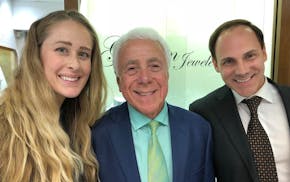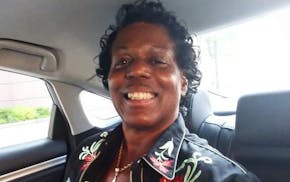What a thoughtful host KSTP-TV meteorologist Ken Barlow is, even when he is having a bad day.
As one of my Twitter followers, he knows how much I disdain Tom Brady and the Patricheats, so Barlow made an effort to conceal ownership of a helmet worn by the multi-Super Bowl winner. The helmet has a prominent place in Ken and Theresa Barlow's family room. The huge Patriots fan had a little fun with this in our video.
Barlow was feeling depressed when I dropped by to talk about his role in bringing awareness to mental health. He powered through and joked that instead of looking into the camera lens, "I'll look at you. Then I can see your 'Shut the hell up' eyes." That's a look that plays across the faces of TV news people when they have enough tape on a subject.
Barlow has bipolar 1 disorder and anxiety. "It's a roller coaster. I don't want [people] to think just because they see me on TV for those three minutes that my life is perfect, because it's not," he said. "It's really hard. ... I call us, when I go out and speak, 'bad asses' because we face challenges a lot of people can't even imagine."
Q: When you are having a bad day, what else do you do besides look at those nice notes people wrote to you when you spoke at Hosanna Church in Lakeville in 2012?
A: When I'm having a bad day, Theresa is my biggest supporter. She has seen this play before and she knows how it's going to end — it's going to end OK. She reminds me that tomorrow is going to be a better day. If I want to lie around because I'm depressed, I should just relax and not overthink it.
Q: Are Americans finally losing their discomfort with mental illness? When you opened up in 2012, that was unusual.
A: Some actors in Hollywood had said stuff about it, like Carrie Fisher, but a lot of people couldn't relate on the local level. When I came forward, a lot of people were surprised because they can watch me on TV and say, "I'd never know he was depressed or manic." I heard from literally thousands of people around here and Wisconsin saying, "I'm so glad you came forward; now I'm more comfortable." I think it's becoming more acceptable; it's just not there yet.
Q: What celebrity were you surprised contacted you?
A: Glenn Close. I was shocked. She runs a place called "Bring Change to Mind," a nonprofit. Her sister [Jessie] has bipolar disorder, so she raises money for that. Ginger Zee from "Good Morning America." I wrote her thanking her for writing a book about her depression and she said to me that I opened the door. And I was just shocked because I don't know her, but somehow she heard about it.
Q: What is a tactful way of asking if somebody's depressed?
A: If you have noticed they've lost interest in something that they love to do normally. Some people get sad. I love to run. I don't run when I'm depressed. If they look like they are just having a bad day, it's OK to go up to them and say, "Are you OK?" Being somebody who that happens to a lot, I appreciate that.
Q: What did you see when Kanye West was in the Oval Office?
A: I saw a man who said he had bipolar disorder who was off his medication. I'm not a psychologist. [But] he talked and talked and rambled and talked about things that nobody [could follow]. He punched his code in his phone in front of the camera. That's just not something people normally would do. A lot of people made fun of it, but for me it wasn't funny, it wasn't crazy, it was sad.
Q: Were you surprised Paul Magers referenced you during a WCCO-AM interview?
A: I was. Paul retired last year, and he's been very public about his alcoholism. When I heard about that, I was very proud of him. Then I heard from somebody that on Chad Hartman's radio show Paul gave me some credit for [inspiring] him to come forward. I love Paul. I was thrilled he said that, but really thrilled he's getting help.
Q: As Pete Davidson said on "Saturday Night Live," there is no shame in taking your meds. Why don't some people take their meds?
A: He has been amazing [since] he came out with the fact that he has, I think, a personality disorder and depression. He brings it to another generation. You have to take them. If you have high blood pressure, you take them. If you have cancer, you get chemo. You should do everything you can to feel better. One of the best things I learned is that you have to take your medicine. When I was diagnosed, I went through all the steps of denial, anger, and then finally I accepted it. [While in anger,] I resisted taking my medicine. Then I did when someone told me, "When you're off your meds, this is how you are." Because I don't see it. It has to be acceptance by that person. You can't force them.
C.J. can be reached at cj@startribune.com and seen on Fox 9's "Buzz." E-mailers, please state a subject; "Hello" does not count.

C.J.: Jerry O'Connell gets support from Wendy Williams for talk show




